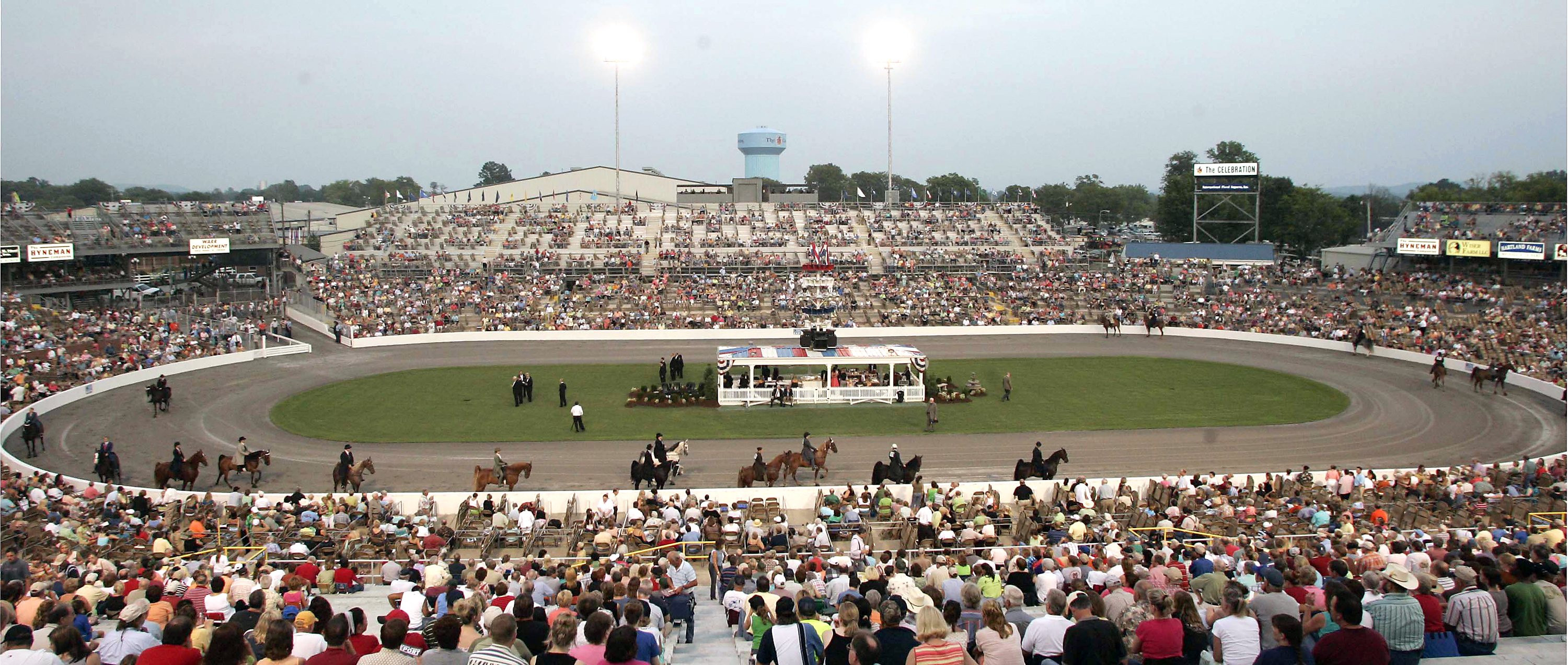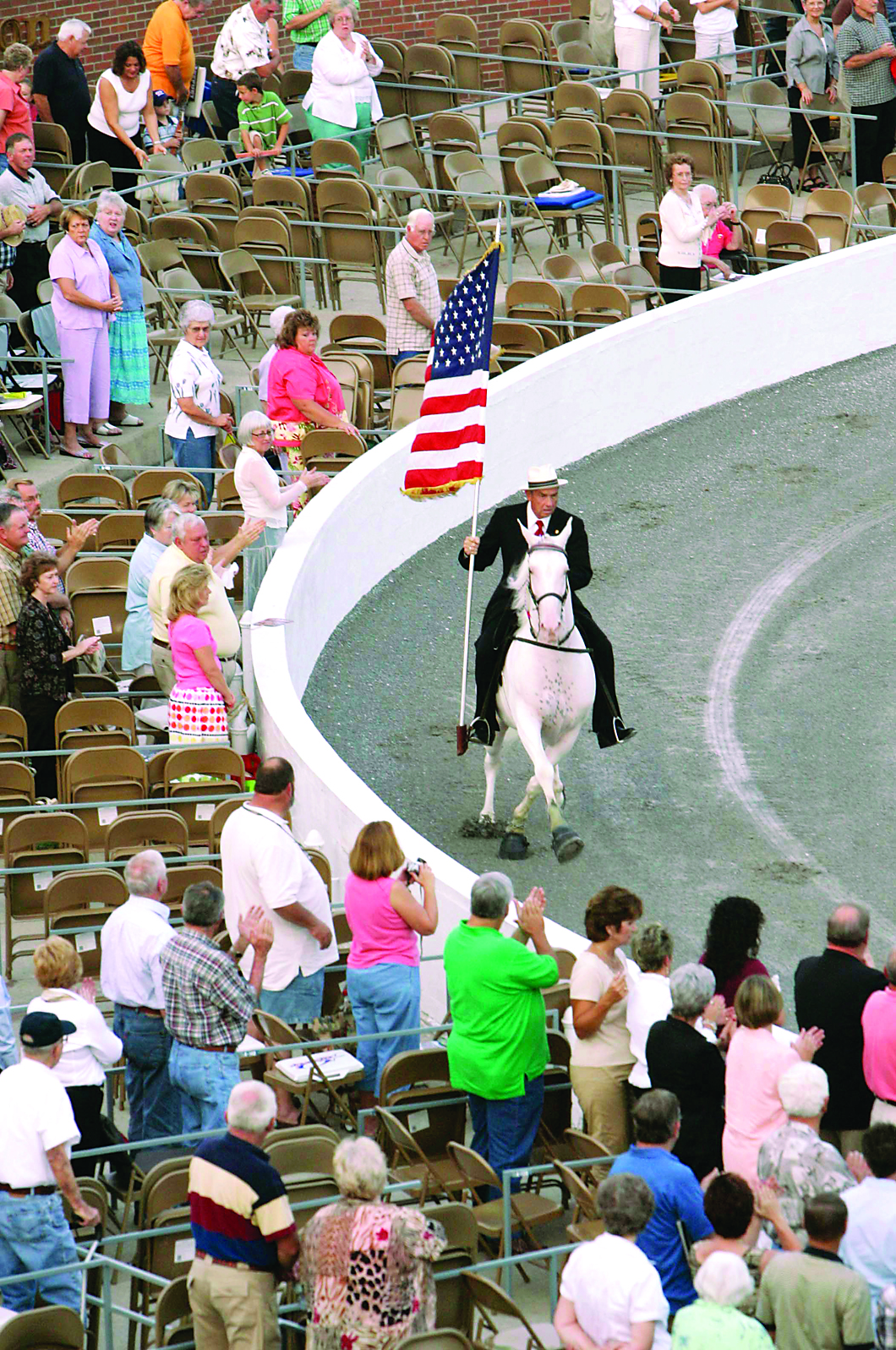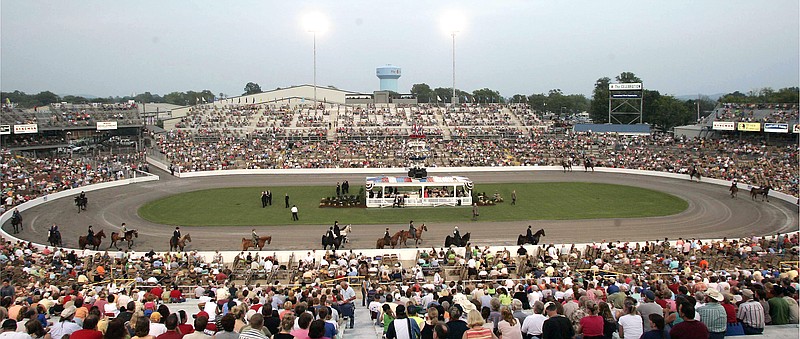 Competition takes place at the Tennessee Walking Horse National Celebration in Shelbyville, Tenn., Aug. 26, 2006. Owners, breeders and trainers of Tennessee walking horses insist the abuse that led to a federal ban 36 years ago has all but vanished. But government inspectors say they have evidence indicating half the show horses tested at the industry's premier event in Shelbyville have sustained abuse that is being covered up. (AP Photo/The Tennessean, Mandy Lunn)
Competition takes place at the Tennessee Walking Horse National Celebration in Shelbyville, Tenn., Aug. 26, 2006. Owners, breeders and trainers of Tennessee walking horses insist the abuse that led to a federal ban 36 years ago has all but vanished. But government inspectors say they have evidence indicating half the show horses tested at the industry's premier event in Shelbyville have sustained abuse that is being covered up. (AP Photo/The Tennessean, Mandy Lunn)Every August, the population in Shelbyville, Tenn., multiplies by 10 as about 200,000 people from across the nation and around the globe trot in to watch the world-famous Tennessee Walking Horse Celebration.
Conceived in 1939, the event features 11 days of horse shows to find the highest-stepping, smoothest-gaited, best-bred Tennessee walking horses. The breed is known for its smooth ride and "big lick" running walk, according to Dale Barnett, spokesman for the Celebration and Calsonic Arena, which includes 63 barns and 1,650 stalls.
Shelbyville, with about 20,000 people, is the county seat of Bedford County, which has the state's largest population of horses -- more than 5,600.
"We're also known as the Pencil Capital of the U.S. for our long-standing history of manufacturing," Barnett said.
Most of the pens and pencils in the country still are made in Shelbyville.
Walkers -- the official state horse of Tennessee -- originated from a blend of Narragansett Pacers and Canadian Pacers in the late 18th century. Tennessee breeders sought a horse that could be ridden all day over the state's large farms spread over the varied terrain of mountain ridges, flat valleys and river deltas.
Confederate Pacer and Union Trotter blood was added during the Civil War, creating the sturdy Southern Plantation horse, also called the Tennessee Pacer. Breeders later added thoroughbred, standardbred, Morgan, and American saddlebred blood to add stamina and refinement to their gaited horse.
The breed registry was formed in 1935. The stud book was closed in 1947. Now every Tennessee Walker must have both parents registered and tracing back to that book to be eligible for its own registration.
 The opening ceremony begins at the Tennessee Walking Horse National Celebration in Shelbyville, Tenn., Aug. 26, 2006. The U.S. Department of Agriculture has toughened regulations aimed to keep some trainers and owners from profiting off the abuse of Tennessee walking horses. The Humane Society of the United States says the new two-year plan announced in March 2007 closes a loophole that has allowed persistent abusers to avoid longer bans on showing and selling prized walking horses, while some in the industry say it goes too far. (AP Photo/The Tennessean, Mandy Lunn, File)
The opening ceremony begins at the Tennessee Walking Horse National Celebration in Shelbyville, Tenn., Aug. 26, 2006. The U.S. Department of Agriculture has toughened regulations aimed to keep some trainers and owners from profiting off the abuse of Tennessee walking horses. The Humane Society of the United States says the new two-year plan announced in March 2007 closes a loophole that has allowed persistent abusers to avoid longer bans on showing and selling prized walking horses, while some in the industry say it goes too far. (AP Photo/The Tennessean, Mandy Lunn, File)AT A GLANCE
-- Population: About 20,000 people (and about 6,000 horses and ponies).
-- Best things to do: Attend the Tennessee Walking Horse Celebration. Tour both the Musgrave Pencil Co., established there in 1916, and the Sanford Corp., another pencil manufacturer.
-- Biggest employer: Tyson Foods with 1,300 jobs.
-- Miles from downtown Chattanooga: 103.
-- Landmarks: Tennessee Walking Horse Celebration and Jack Daniel Distillery in nearby Lynchburg.
-- Date founded: 1819.
-- Historic info: Named for Issaac Shelby, a Revolutionary War hero who later served as the governor of Kentucky and was a leader in developing agriculture in Tennessee and Kentucky.
-- Unique traditions: Tennessee Walking Horse Celebration.
-- Hot news: From June 11-16, 2012, the Calsonic Area also will host the National Antique Car Show.
